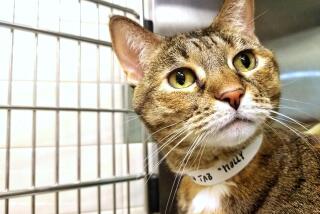A Cat That Has Heart Murmur
- Share via
Q: My veterinarian told me my cat has a heart murmur. She is 12 years old, spayed, up-to-date on all her shots and usually indoors (always at night). Are there any precautions I can take to keep her in good health?
Lauretta Lee, La Habra
A: A heart murmur is the sound that is heard most often when blood that is being pumped through the heart starts to flow back against one of the four major valves of the heart. This occurs when a valve, which normally allows blood to flow in one direction, becomes defective or scarred and loses some of its function. The murmur can range from being barely audible to a loud pounding sound, depending on the type of valve defect, which can be heard in animals that are very anemic or infected with heart worms.
In your cat’s condition, it would be wise to get some base-line data such as a chest X-ray to determine the size and shape of the heart as well as the condition of the lungs and major thoracic vessels, along with an electrocardiogram to evaluate the electrical conductivity of the heart. These two diagnostic tools are very important to evaluate the condition of your cat’s heart. A blood-test profile, to include the electrolytes sodium and potassium, will also be important in determining your cat’s overall health. If your cat’s heart appears to be too large on X-rays, an echocardiogram, using sound waves, will be very beneficial in checking the condition of your pet’s heart.
At home, you need to keep your cat on a good diet, recommended by your vet, in order to keep her weight under control and avoid excess salts. Exercising a cat may be limited to playing with her. If her heart condition is severe, you may want to avoid any strenuous type of play. An occasional follow-up examination, at least yearly, will help keep track of her health.
Q: In the mornings, my dog, a springer spaniel, seems to have a discharge from her eyes that I clean with a wash cloth. Some days it is very thick and difficult to remove, and other days there is very little there. Could she have an eye infection or be sick from something else? She eats well, is very active and seems to be healthy. Should I be worried?
Pamela Shriffe, El Toro
A: Many dogs have a normal mucus discharge from the eyes, especially if they are outside most of the time. Certain breeds, such as St. Bernards, golden retrievers and cockers with “baggy” lower eyelids, seem to have more of a problem than other dogs. It would be wise to have her eyes checked by your veterinarian to make sure there is no infection or lack of tear production that could lead to very serious complications. Your vet may prescribe some ophthalmic solution or ointment to be put into the eyes on a daily basis to protect them from developing any problems. Special tests may be necessary if an infection or injury is suspected. Injury to the cornea can develop if the condition is untreated.
Q: We have a 5-year-old tabby that until two months ago was both an indoor and outdoor cat, usually remaining inside during the night. We have since found that our daughter is allergic to her, and we have had to keep the cat outside permanently. This hasn’t seemed to bother our cat, but I worry about the weather turning colder and what kind of shelter she will need. We do not have a garage and cannot make any part of our house accessible to her. If she is not used to a doghouse type of structure, is it useless to try one? Our porch offers a covering but is open to the elements. Please help us find a workable solution.
T. Moore, Garden Grove
A: Cats are very adaptive to most climate changes but do require some kind of shelter. You might try building a small enclosed “house” similar to a scratching-post structure and mount it off the ground under the carport. It should be large enough to provide her room in which to move around and maybe enough space to put some food. Lining or insulating it will help keep it warm, and covering the opening with a cloth or “kitty” door-type device will give her privacy and protection from the wind. It should be off the ground. It should be built so that it will be easy to keep clean and change the lining.
More to Read
Sign up for Essential California
The most important California stories and recommendations in your inbox every morning.
You may occasionally receive promotional content from the Los Angeles Times.











